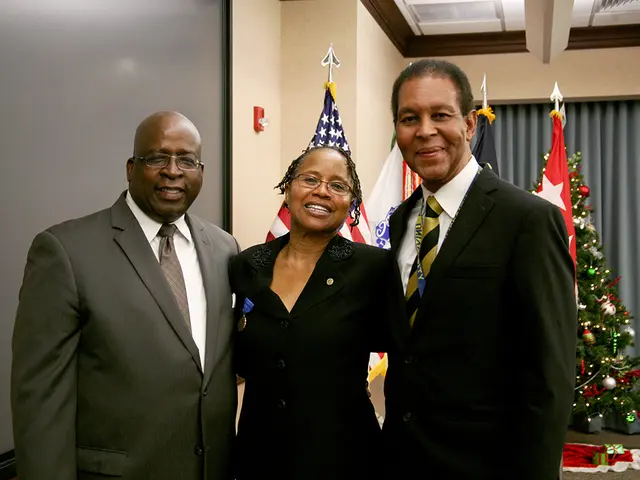Recognize the finalists contending for the 2025 Griffin Poetry Prize.
The Griffin Poetry Prize, the world's most prestigious award for a single book of poetry in the English language, has announced its 2025 shortlist. The winners will be revealed at a ceremony in Toronto on June 4th, with the winner receiving C$130,000 and each shortlisted poet taking home $10,000.
In the run-up to the ceremony, Literary Hub conducted interviews with several of the shortlisted poets and translators, delving into their literary lives and preferences.
Brian Henry, the translator of Tomaž Šalamun's "Kiss the Eyes of Peace," shared his emotional book experiences. Donna Tartt's "The Goldfinch" left an indelible impression on him, sparking a myriad of emotions as he read. He also praised other novels, such as "The Remains of the Day," "The Go-Between," and "Lie With Me," for their emotional impact.
Rereading is a regular practice for Henry, with Walter Benjamin's "Berlin Childhood Around 1900," Jennifer Moxley's "There Are Things We Live Among," Fernando Pessoa's "The Book of Disquiet," and Rosa Liksom's "Compartment No. 6" often gracing his reading list. His first lovingly remembered book was "Piggle" by Crosby Bonsall, a title that offered a glimpse into childhood meanness and delightful wordplay.
How he selects his next book reading remains a casual process, with new books found in various places, including on his work desk, nightstand, and bookshelves. One book he wishes he had read in his younger years is "The Catcher in the Rye."
Carl Phillips, the author of "Scattered Snows, to the North," expressed his wish that his younger, confused self would read his book. He hoped it might help him understand that people continue to question their identity as they grow. Phillips revealed that his writing routine is surprisingly informal, involving activities like dinner preparation, walking a dog, and reading for multiple hours each night.
Pop, indie, and alternative music play a crucial role in Phillips' life, making him unable to imagine his life without them. He frequently rereads books by Barbara Pym, Linda Gregg's "To Bright to See," and the translations of Li Po and Tu Fu by J.P. Seaton and James Cryer, among others.
If Phillips weren't a writer, he would choose to be the lead singer in a band or a backup singer for Sade.
Diane Seuss, the author of "Modern Poetry," expressed her dedication to her reader, wishing one of them could be her deceased father, allowing her to share her work with him.
To tackle writer's block, Seuss assigns herself tasks that challenge her writing habits, such as writing short, music-centered poems in opposition to her regular narrative style. Music has become essential to keeping her emotionally and spiritually alive, resurrecting long-dormant feelings within her. "Piggle" was the first book she fell in love with, captivating her with its portrayal of childhood cruelty and playful language.
In interviews, Seuss often finds herself yearning to discuss the exceptional environment that shaped her during her youth.
Karen Leeder, the translator of Durs Grünbein's "Psyche Running," attributed her literary education to Mr. David, a German teacher who fueled her fascination with the language during her teenage years. She discovered "The Oxford Book of English Verse: 1250-1900" at that time, a book that introduced her to numerous disparate voices from the English literary tradition.
When faced with writer's block, Leeder finds solace in translation, as it offers a structured starting point and a clear goal. The collection of advice she has received ranged from reading the text out loud to seeking inspiration in different genres. She frequently rereads Shakespeare, Auden, Woolf, Bishop, Heaney, and many others.
If Leeder hadn't become a writer, she would have pursued a career as an astronaut or an actor. When she wants to procrastinate, she often finds herself absorbed in newly published poetry.
Aaron Coleman, the translator of Nicolás Guillén's "The Great Zoo," looks forward to discussing the intersection of his work as a poet and translator. His recent translation of "The Great Zoo" and his second poetry collection, "Red Wilderness," have been released within six months of each other, leading him to reconsider the connection between the two works.
Coleman overcomes writer's block by indulging in work and art that pique his curiosity, particularly rhythm-driven poems, translations from languages like Spanish and French, and theoretical or academic books that help him reconsider the context or history of the issues that matter to him.
Silence is a crucial aspect of Coleman's writing routine, as he seeks moments of relaxation and the opportunity to listen more closely to the world around him.
[1] https://www.theglobeandmail.com/arts/books/griffin-poetry-prize-2025-shortlisted-works/article-38411402/[2] https://www.cbc.ca/books/just-announced-the-2025-griffin-poetry-prize-shortlist-1.6431503[3] https://lithub.com/catapult-has-shortlisted-possible-nominees-for-the-2025-griffin-poetry-prize/
- Brian Henry, the translator of Tomaž Šalamun's "Kiss the Eyes of Peace," shared his emotional book experiences, praising novels like "The Remains of the Day," "The Go-Between," and "Lie With Me" for their emotional impact.
- Henry, in conversations, also spoke about his regular practice of rereading books, frequently returning to titles like Walter Benjamin's "Berlin Childhood Around 1900," Jennifer Moxley's "There Are Things We Live Among," and Rosa Liksom's "Compartment No. 6."
- The first book Henry fell in love with was "Piggle" by Crosby Bonsall, a title that offered a glimpse into childhood meanness and delightful wordplay.
- Diane Seuss, the author of "Modern Poetry," expressed her dedication to her reader, wishing one of them could be her deceased father, allowing her to share her work with him.
- Music, particularly rhythm-driven poems and translations from languages like Spanish and French, helps Aaron Coleman, the translator of Nicolás Guillén's "The Great Zoo," overcome writer's block.
- Carl Phillips, the author of "Scattered Snows, to the North," revealed that his writing routine is surprisingly informal, involving activities like dinner preparation, walking a dog, and reading for multiple hours each night.
- Pop, indie, and alternative music play a crucial role in Phillips' life, making him unable to imagine his life without them.
- Karen Leeder, the translator of Durs Grünbein's "Psyche Running," attributed her literary education to Mr. David, a German teacher who fueled her fascination with the language during her teenage years.
- Leeder, when faced with writer's block, finds solace in translation, as it offers a structured starting point and a clear goal, frequently rereading authors like Shakespeare, Auden, Woolf, and Heaney.








